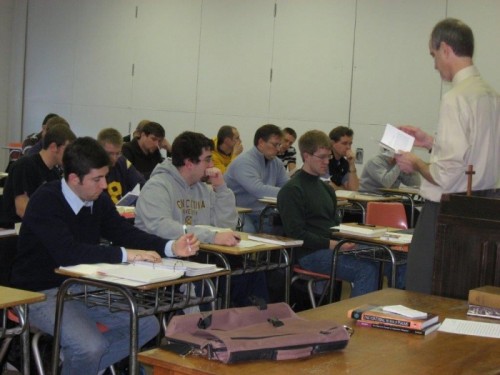 The faculty of Concordia Seminary is in the midst of an assessment and revision process for the residential Master of Divinity, Alternate Route, and Deaconess Studies curricula, and we’d like to hear from you. Curriculum revision is an ongoing process; individual courses are added or adjusted regularly. Here are some of the considerations that the faculty has already recognized:
The faculty of Concordia Seminary is in the midst of an assessment and revision process for the residential Master of Divinity, Alternate Route, and Deaconess Studies curricula, and we’d like to hear from you. Curriculum revision is an ongoing process; individual courses are added or adjusted regularly. Here are some of the considerations that the faculty has already recognized:
- The residential program at Concordia Seminary remains the premier program for teaching, training, and forming pastors.
- Our revision will take into account not only course content and sequence, but pedagogy, field education and vicarage, spiritual life, family expectations, and financial considerations.
- The debt that students bring to the seminary from their undergraduate programs continues to increase dramatically; seminary-related debt has been able to be controlled, but the overall debt with which students graduate has increased dramatically over the last five years. The spiraling costs of undergraduate education and the impact of the economic downturn that began in 2008 have both contributed to this increase.
- The pluralistic, non-churched, and indeed anti-Christian culture in which our congregations live creates greater challenges for faithful witness to Christ and his Word. The need for clear, sound, and winsome scriptural and confessional witness is greater than ever.
- Students are coming to the seminary from a wide range of backgrounds, education, and contexts.
- Greek and Hebrew will remain requirements for entrance into the MDiv program, and Greek will still be required in the Alternate Route program. Concordia Seminary is the only seminary in the LCMS, and one of only a handful in the country, that require that students pass standard Greek and Hebrew exams before beginning their program of study.
- Time pressures are constant on students. Between time in class, study, field education, worship, family, and work, their schedules are increasingly full and occasionally study, worship life, or family receives too little attention.
- The reality that most of the congregations in the LCMS are plateaued or declining in size makes it more difficult for these congregations to support a full-time pastor.
- The opportunities and needs for pastors with specialized skills in outreach, church planting, cross-cultural ministry, youth and family ministry, etc., are significant.
These few items, of course, are not comprehensive and represent only a sample of the issues that the faculty is taking into account in this process.
Information about the current configuration of our Master of Divinity program is available here.
As the faculty revises the curriculum we have shared our thinking with our graduates, students, the Council of Presidents of the LCMS, and our colleagues at Concordia Theological Seminary, Fort Wayne. We have also surveyed pastors, laity, and the COP. We are now reaching out to pastors, church workers and interested lay people to learn what you believe to be the key knowledge, skills, and dispositions needed for a pastor to succeed in the ministry. It consists of four open-ended questions and should take approximately 10-15 minutes to complete. The survey will be available from Monday July 7th – Saturday July 19th. We thank you for your time and help in forming the future pastors of the LCMS.
Take the survey now.
With thanks for your partnership in the Gospel,
Jeff Kloha
Provost, Concordia Seminary

Leave a Reply
You must be logged in to post a comment.